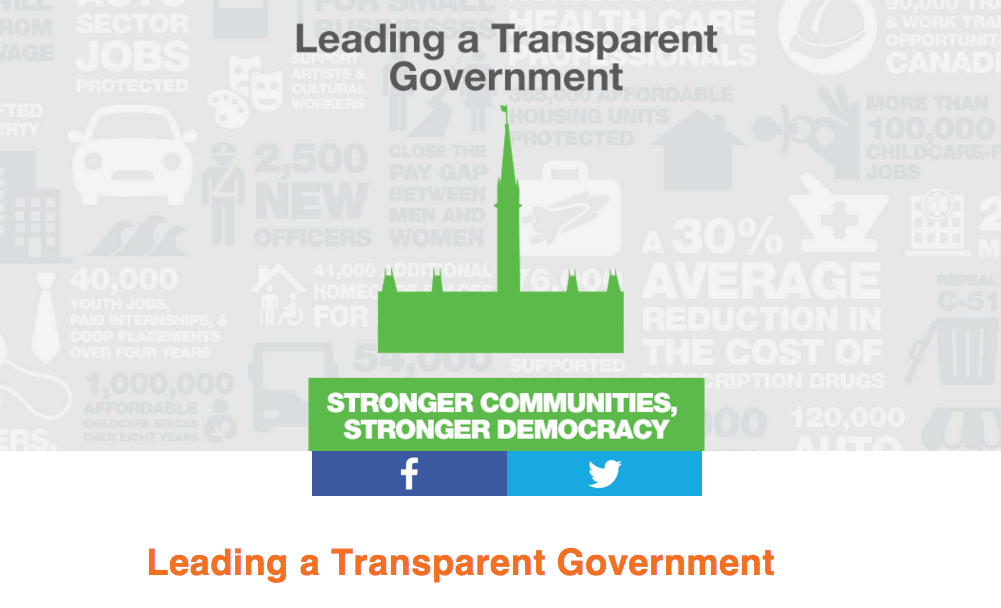Questions remain about NDP’s FOI platform
It’s not clear if an NDP government would implement all of the information commissioner’s recommendations.
By Sean Holman
Last month, the Toronto Star reported the NDP would have more to say on freedom-of-information reform before Election Day.
Twenty-eight days later (and just ten days before Canadians go to the polls) the party has finally opened its mouth after having spent the past nine years criticizing the Conservative government’s secrecy.
As part of its election platform, the NDP has promised six bullet points worth of fixes to the Access to Information Act—the long-broken law that is supposed to allow the people and the press to obtain unreleased government records but too often doesn’t.
Those proposals, totaling 116 words, match or surpass many of those already advanced by the Liberals.
Both parties promise to eliminate all access-to-information fees except the $5 cost to file a request.
Both parties promise to give the information commissioner the power to order the release of government records.
And both parties promise to make the administration of Parliament, the prime minister’s office and ministers’ offices subject to the Access to Information Act.
The NDP isn’t committing to review the Act every five years or make government data and information available in “formats that are modern and easy to use” as the Liberal platform does, nor does it make the so-far empty promise of having government information be “open by default”—which, according to commissioner Suzanne Legault, is the way that law is already written.
But, unlike the Liberals, the NDP would require public officials to document their actions and decisions.
It would make claims of cabinet confidentiality subject to review by the commissioner.
And it would give access-to-information users a means of forcing the government to release information that’s in the “public interest.”
That appears encouraging.
But the effectiveness of that mechanism will depend on how the NDP defines the “public interest.”
After all, the public interest override in British Columbia’s freedom-of-information law is so narrowly defined that it’s been almost useless.
Similarly, the NDP has promised to “start implementing the Commissioner’s recommendations to strengthen and modernize the Act.”
But does that mean all of the Commissioner’s recommendations, including proposed reforms to the exclusions and exemptions in the Act?
I emailed George Smith, Tom Mulcair’s press secretary, asking for answers to those questions on Oct. 10, with a deadline of Oct. 14. I’ll let you know if I get an answer.
The NDP’s proposed Access to Information Act reforms are part of the party’s commitment to lead a “transparent government” that’s more open and accountable than the Harper administration. But some of the party’s dealings with journalists during the election campaign could give cause to doubt that claim.
On Saturday, the Globe and Mail published an 8,927-word profile of Mulcair after “all efforts” to interview him over a two-month period failed. According to the newspaper:
“E-mail and in-person requests made to various people, from the chief press officer and chief of staff to the press secretary and campaign manager, led nowhere. Eventually, our inquiries were sent down the chain of command, and landed with a junior press officer, who did not return calls. Ten weeks after our initial request, and shortly before going to press, The Globe and Mail was offered a telephone interview – an offer we declined due to the imminent publication date. That prompted a senior aide to say that a face-to-face interview could be arranged; this request was rejected for the same reason.”
That wouldn’t be so troubling if Mulcair hadn’t also refused to take questions during his campaign launch, with the Toronto Star noting he was the only leader not to do so:
“Conservative Leader Stephen Harper, notorious for how rare he is available to media, took five questions from reporters outside Rideau Hall Sunday morning. Those questions had conditions, though: the questions were restricted to those media outlets that have agreed to go on tour with the Conservatives, at a cost of $12,500 a week. Liberal Leader Justin Trudeau, who launched his campaign in Vancouver several hours after the other two, was prepared to answer more questions than the seven reporters there had for him.”
Could this be a sign that an NDP government would only be open and accountable on its own terms?
Correction: an earlier version of this story incorrectly stated when the NDP platform was released. We apologize for the error.
H.G. Watson was J-Source's managing editor from 2015 to 2018. She is a journalist based in Toronto. You can learn more about her at hgwatson.com.

